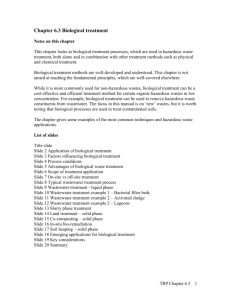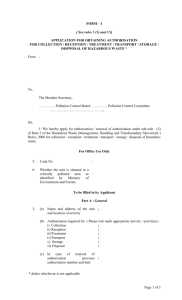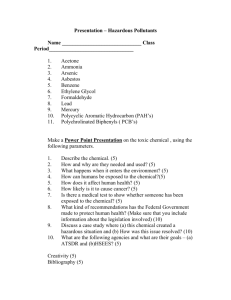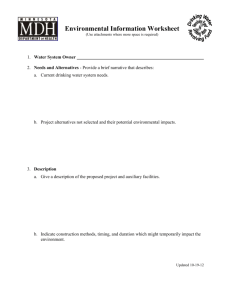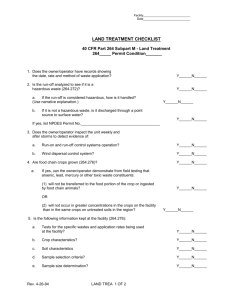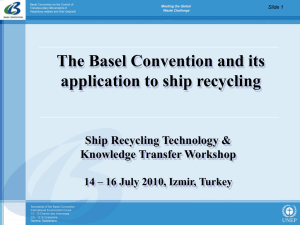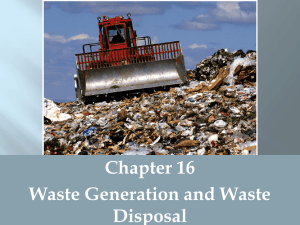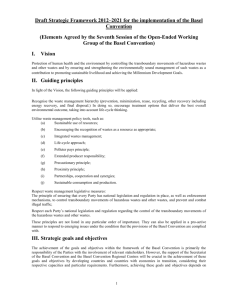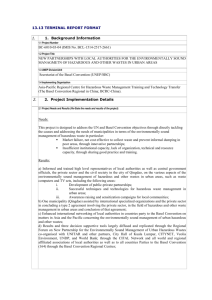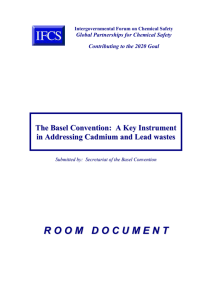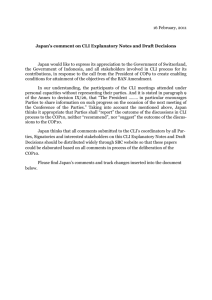World Environment Day 2005
advertisement
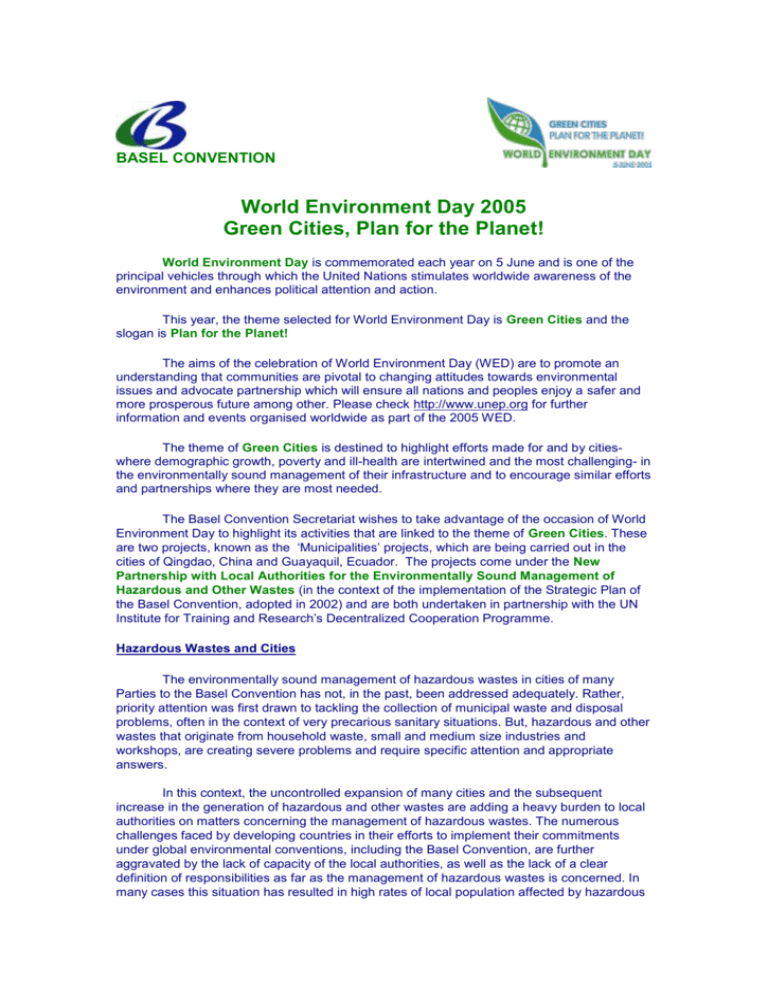
BASEL CONVENTION World Environment Day 2005 Green Cities, Plan for the Planet! World Environment Day is commemorated each year on 5 June and is one of the principal vehicles through which the United Nations stimulates worldwide awareness of the environment and enhances political attention and action. This year, the theme selected for World Environment Day is Green Cities and the slogan is Plan for the Planet! The aims of the celebration of World Environment Day (WED) are to promote an understanding that communities are pivotal to changing attitudes towards environmental issues and advocate partnership which will ensure all nations and peoples enjoy a safer and more prosperous future among other. Please check http://www.unep.org for further information and events organised worldwide as part of the 2005 WED. The theme of Green Cities is destined to highlight efforts made for and by citieswhere demographic growth, poverty and ill-health are intertwined and the most challenging- in the environmentally sound management of their infrastructure and to encourage similar efforts and partnerships where they are most needed. The Basel Convention Secretariat wishes to take advantage of the occasion of World Environment Day to highlight its activities that are linked to the theme of Green Cities. These are two projects, known as the ‘Municipalities’ projects, which are being carried out in the cities of Qingdao, China and Guayaquil, Ecuador. The projects come under the New Partnership with Local Authorities for the Environmentally Sound Management of Hazardous and Other Wastes (in the context of the implementation of the Strategic Plan of the Basel Convention, adopted in 2002) and are both undertaken in partnership with the UN Institute for Training and Research’s Decentralized Cooperation Programme. Hazardous Wastes and Cities The environmentally sound management of hazardous wastes in cities of many Parties to the Basel Convention has not, in the past, been addressed adequately. Rather, priority attention was first drawn to tackling the collection of municipal waste and disposal problems, often in the context of very precarious sanitary situations. But, hazardous and other wastes that originate from household waste, small and medium size industries and workshops, are creating severe problems and require specific attention and appropriate answers. In this context, the uncontrolled expansion of many cities and the subsequent increase in the generation of hazardous and other wastes are adding a heavy burden to local authorities on matters concerning the management of hazardous wastes. The numerous challenges faced by developing countries in their efforts to implement their commitments under global environmental conventions, including the Basel Convention, are further aggravated by the lack of capacity of the local authorities, as well as the lack of a clear definition of responsibilities as far as the management of hazardous wastes is concerned. In many cases this situation has resulted in high rates of local population affected by hazardous substances as well as by contamination of the surrounding environment such as fresh water reserves and rivers. Experience shows that the issue of the sound management of hazardous wastes in urban areas should be linked to the management of municipal wastes. An integrated approach in the management of hazardous waste, which will make local government more accountable, and therefore a valuable partner in the management of hazardous waste generated in urban areas seem to be a reasonable way forward. In particular, local authorities should set as one of their main priorities the need to ensure that those hazardous wastes are separated from the non-hazardous municipal waste streams with the aim of disposing them in environmentally sound disposal facilities. In addition, it is critical that efforts should be made to collect, systematize and diffuse the information concerning the experience built along the years by important stakeholders involved in the implementation of the Basel Convention at the local level such as local authorities, NGOs, and the private sector. In this regard, city-tocity and institutional cooperation are considered a valuable instrument for capacity building that would deserve to be consolidated. Qingdao, China The municipality project in the city of Qingdao, China, is reaching completion and has been managed by the Basel Convention Regional Centre in China on behalf of the Basel Convention Secretariat, with the Chinese State Environmental Protection Administration (SEPA) and the Qingdao Environmental Protection Bureau (QEPB). It addresses the problematic issue of the environmentally sound management of hazardous waste with a particular emphasis on electronic waste (E-waste), such as computers or mobile phones for example. The project established a local mechanism in Qingdao for the environmentally sound management of E-waste in the city. It also promoted the updating of the legal framework of hazardous waste management in the city by QEPB, especially as far as E-waste management is concerned. The updating of the legal framework for E-waste management has been opportune as the Chinese National Development and Reform Commission (NDRC) issued an “Administration Ordinance on Recycling and Treatment of Discharged Electric and Electronic Appliances” in September 2004. Going beyond the environmentally sound management of E-waste, the Qingdao authorities are currently preparing a comprehensive hazardous waste mechanism and have issued further regulations and guidelines, such as the “Regulation on Operation Permit for Hazardous Waste” in Qingdao, the “Notification on Further Tightening Centralized Environmental Management” and the “Operation for Medical Waste, Guidelines of Hazardous Waste Management and Operation in Qingdao”. An information sharing workshop took place in December 2004, with a view to the adapted replication of the project in other Chinese and Asian cities, at which the BCRC China, UNITAR, CITYNET, Veolia Environnement, the UN Development Programme and the World Bank participated, in partnership with the City Hall of Kuala Lumpur. Guayaquil, Ecuador The Guayaquil project, launched in March 2005, aims to set up, operate and maintain a comprehensive system for the environmentally sound collection, testing, and final disposal of oily waste, including the co-processing of oily waste in cement kilns. This unique initiative involves the city authorities of Guayaquil, the national authorities in Ecuador, the cement and oil industries where the company Holcim is the main industrial partner, and civil society. The municipality of Guayaquil, as well as other municipalities in Ecuador, are faced with the acute problem of managing oily wastes of different origins. Much of the oily wastes in the country end up in river courses. These oils have a considerable potential to cause damage to the environment and health by virtue of their persistence and ability to spread over large areas of land and water. Common sources of such used oils are lubrication, metal machine/cutting, tank washings in oil depots and refineries, electrical power equipments (transformers and capacitors). By nature of their use, they will contain various contaminants including heavy metals, combustion products and substances arising from their original use. Of particular concern are the oils contaminated with PCBs. The main result of the municipality project will be a comprehensive, sustainable, environmentally sound mechanism for the collection, storage, testing and co-processing of oily wastes put in place in the municipality of Guayaquil. Additional benefits will be the involvement of local authorities and local operators in the collection, transport, storing and testing of wastes oils. The project will be replicated through enhanced collaboration between the local authorities in Guayaquil with Belo Horizonte in Brazil, thus forging a twinning programme on matters concerning the environmentally sound management of hazardous and other wastes. About the Basel Convention The Basel Convention on the Control of Transboundary Movements of Hazardous Wastes and their Disposal is the most comprehensive global environmental agreement on hazardous and other wastes. It has over 160 Parties and aims to protect human health and the environment against the adverse effects resulting from the generation, management, transboundary movements and disposal of hazardous and other wastes. It came into force in 1992. The Basel Convention regulates the transboundary movements of hazardous and other wastes and obliges its Parties to ensure that such wastes are managed and disposed of in an environmentally sound manner. The Convention covers toxic, poisonous, explosive, corrosive, flammable, ecotoxic and infectious wastes. Parties are also expected to minimize the quantities that are moved across borders, to treat and dispose of wastes as close as possible to their place of generation and to prevent or minimize the generation of wastes at source. At its sixth meeting in 2002, the Conference of the Parties to the Basel Convention agreed to develop a work programme for cooperation with industry, business sectors, nongovernmental organizations and civil society with the aim of developing strategic partnerships relevant to the implementation of the Convention, its amendments and protocols. The Basel Convention has 14 Basel Convention Regional and Coordinating Centres in the following locations: Argentina, China, Egypt, El Salvador, Indonesia, Iran, Nigeria, Russian Federation, Senegal, Slovak Republic, South Pacific Regional Programme, South Africa, Trinidad and Tobago, Uruguay. They deliver training and technology transfer for the implementation of the Convention. For more information about the Municipalities Projects, please contact Mr. Vincent Jugault, Programme Officer, Basel Convention Secretariat, tel: +41 22 917 82 23, Vincent.Jugault@unep.ch. For information about the Basel Convention, please contact Nicole Dawe, Information Officer, Basel Convention Secretariat, tel:+41 22 917 82 20, Nicole.Dawe.@unep.ch

